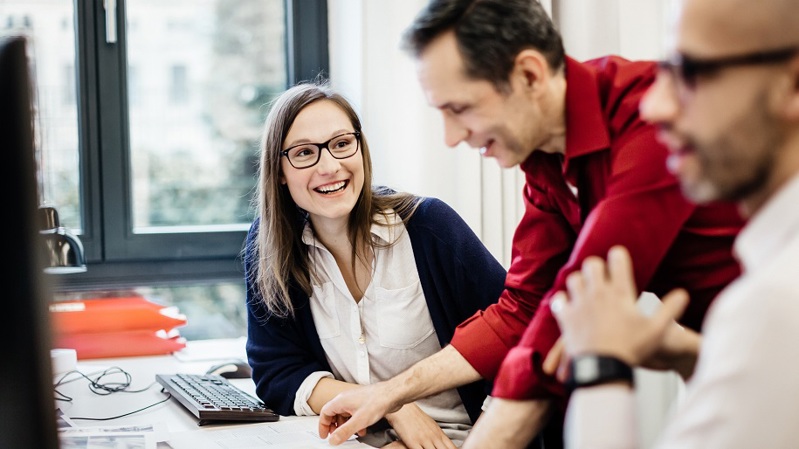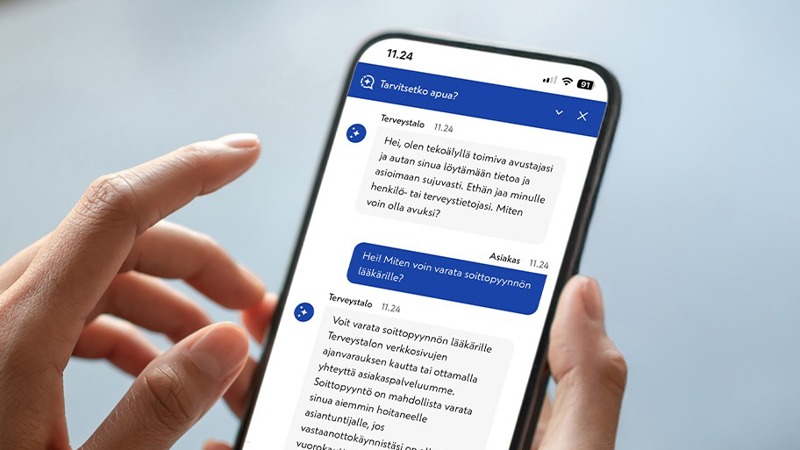Healthy working life barometer: 47% think Finnish working life is healthy - CEOs have a rosier view of the state of working life than HR managers and supervisors
Terveystalo's annual Healthy Working Life Barometer surveyed the state of Finnish working life, the ability of organisations to respond to changing working life and the role of occupational health in working life.

The Barometer's responses reveal that efficiency and productivity are still at the heart of Finnish working life. As many as 81% of respondents believe that working life is becoming more fast-paced and stressful. In particular, the Barometer highlights a clear difference of opinion between CEOs and HR managers and supervisors in their ability to take into account the cognitive load associated with job descriptions or tasks. As many as 74% of CEOs consider their organisation's ability to cope with stress to be good, compared to just over 50% of PMs and HR managers.
– However, while management has a clear vision and good will to put human factors above efficiency, this is not yet necessarily reflected sufficiently in day-to-day work, organisational processes and structures. The difference in perception is also influenced by the fact that line managers have a more concrete picture of the situation and pressures in their own units than senior managers. However, the attention paid to human factors has increased by 6 percentage points since the previous survey, which indicates a change towards a more balanced working life. In the long run, humanity will take over from efficiency, as long as this development is supported," says Outi Ikonen, senior organisational psychologist at Terveystalo.
Opportunities in continuous learning
Riia Astola-Pöllänen, Senior Work Capability Coach at Terveystalo, believes that a good work-life discourse overall needs to be freed up, because the general debate seems to emphasise workload too much already and we forget the opportunities offered by increasing skills. Although senior management and supervisors have different views on the healthiness of working life, all groups stress that continuous learning and skills maintenance, as well as digitalisation, offer the greatest opportunities.
– Fear of not knowing and learning new things can be seen as a health challenge, especially if there are other simultaneous stressors in life. However, skills challenges are usually very surmountable, as long as they are tackled early. People have a lot of knowledge and ability, but their confidence in their own learning can be low and their ability to see solutions impaired. By working together to articulate skills and thinking about the additional training needed, for example, solutions can usually be found. In the best case, the feeling of incompetence can be transformed from a burden to an enthusiasm for learning.
Competition for talent is the biggest challenge in working life
The barometer shows that the shortage of professionals and competition for talent is perceived by all respondent groups as a major challenge for the future of working life. According to the responses, responding to labour shortages has therefore increased the ability of organisations to take account of individual differences in performance and working ability. Although senior managers are also more confident about this issue, around half of HR managers and supervisors agree to some or all extent that their organisation has the capacity to take into account the needs and expectations of different age groups in terms of management.
– It is good to see that organisations have both the support of senior management and the confidence that operational level policies provide at an individual level to take account of both physical and cognitive work and functional capacity and to adapt work accordingly. When supervisors have sufficient competence in work capacity management, they can more boldly seek solutions to find meaningful work in situations where work capacity is partially or temporarily reduced," says Silja Komulainen, deputy senior physician in occupational health at Terveystalo.
CEOs' and entrepreneurs' confidence in their ability to influence the business world on the decline
A worrying phenomenon is that respondents feel that their ability to influence Finnish working life is significantly weaker than a year earlier. Compared to the 2023 results, there is a significant drop especially among CEOs (-8 percentage points) and entrepreneurs (-13 percentage points). This change can be explained by the chaotic business environment and economic uncertainty.
– In particular, CEOs and entrepreneurs have recently had to repeatedly come up with solutions in the face of constant change and crisis. Understandably, this can lead to a loss of experience of their own empowerment in the wider context. On the other hand, the development of working life takes place not only at the societal level, but also in every workplace and every unit. All staff should feel that they can have a say in improving working conditions," says Ikonen.
In order to work smarter and in a humanly sustainable way, there must be time for work development. Line managers have an important role to play here, but how time and resources are allocated to work development is also a strategic choice.
– The ability to enable continuous learning at work has seen a welcome and significant increase, up to 7 percentage points according to frontline staff. This shows that taking care of one's own labour market value is not just a night's work and the responsibility of the individual," says Ikonen.
* The Healthy Working Life Barometer was conducted as an online panel on 01-02/2024 with 921 respondents, representing a broad range of decision-makers in the roles of supervisors, HR managers, CEOs and entrepreneurs.
Read more occupational health articles

What is metabolic age and why should you care about it?
A new laboratory study by Terveystalo reveals how your body is aging. Metabolic age makes biological aging visible.

Smooth assistance for your needs – our AI assistant is now at your service
You can now find Terveystalo’s AI assistant on our website — a quick and easy way to get answers based on the information available on our site. For now, the assistant is available only on the Finnish‑language section of our website, but you can chat with it in English.

How technology helps relieve mental stress: "When the load is high, the threshold must be low."
Mental health disorders have overtaken musculoskeletal disorders, which had long been the leading cause of sick leave. Work is changing, and the range of sick leave caused by mental health issues has also changed. We must be able to offer new solutions to this challenge.

Extensive data set of 200,000 samples: Nightingale study reveals link between illness risks and sick leave
Data from the Finnish Nightingale study, which is used in Terveystalo's occupational health services, reveals a clear link between lifestyle-related health risks and sick leave. The exceptionally extensive data set of over 200,000 customers shows that people with a low risk of illness had significantly fewer absences, while those in high-risk groups had more absences. The results highlight the importance of preventive healthcare in ensuring work ability and the competitiveness of companies.

Strong identification speeds up your service experience when calling us
Soon you can identify yourself easily and securely before your call is answered. Read below to see how the identification process works.

Terveystalo's digital services have been awarded the internationally recognized ISO27001 information security certification.
Terveystalo's information security practices, processes, and risk management are in line with international best practices.